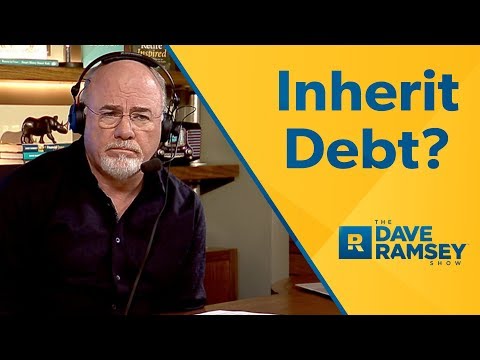In the maze of financial dealings and obligations that follow the passing of a loved one, a pressing question often emerges: do you inherit your parents’ debt? This query, hitting a crossroad of legal nuances and emotional undertones, demands exploration with a balanced mix of pragmatic wisdom and empathetic guidance. So, let’s embark on a journey to unravel the enigma of debt inheritance, addressing, with care, the conundrums it may present to our financial legacy.

Demystifying Debt Inheritance: Do You Inherit Your Parents’ Debt?
Understanding Debt After Death
In life, debts can be as certain as death and taxes. However, when death comes knocking, what happens to those debts often leads to confusion and myths. So, let’s set the record straight: typically, you are not personally responsible for your parents’ debts. When they pass on, any debts are usually paid out of what they left behind, meaning their estate. Consequently, your inheritance could be impacted by the repayment of these debts.
The historical context of debt handling after death stretches back centuries and, over time, legal precedents have evolved to protect both creditors and survivors. It’s crucial to grasp that these standards ensure that, while debts may diminish an inheritance, they rarely jump across generations to become a child’s personal encumbrance.

Can You Inherit Debt? Exploring Legal Nuances
Uncovering whether one “inherits” debt necessitates a deep dive into the legal bedrock of estate and inheritance laws, which can be as varied as the landscapes they govern. Can you inherit debt? Generally not, but some conditions make this scenario more complicated than a simple ‘no.’
Debt Obligations: What Laws Say
National and state laws are the architects of debt inheritance protocols. Though there’s uniformity in the overarching principle—that an estate settles debts before assets are distributed to heirs—the devil’s in the details. Certain statutory differences exist that can profoundly affect surviving family members.
For instance, the surviving spouse’s responsibility for the departed’s debt can vary depending on whether they resided in a community property state or not. It’s a mixed bag of legal provisions, shaped by where your parents called home.
The Role of Executors and Probate in Debt Settlement
The plot thickens when executors enter the picture. These appointed persons or institutions are trusted to reconcile the outstanding debts during probate—the legal process that settles an estate. However, an executor’s missteps can indeed muddle matters, inadvertently dragging out or complicating the inheritance process.

| Situation | Do You Inherit the Debt? | Exceptions/Notes |
| General Inheritance of Debt | No | Debts are typically settled using the estate’s assets. |
| Parent Passes Away with Debt | Estate is liable, not the individual | Debt can reduce the inheritance, as it must be settled before distribution of the estate. |
| Joint Debt with Deceased Parent | Yes | If you cosigned a loan, held a joint account, or are otherwise jointly liable, you are responsible for the debt. |
| Surviving Spouse | Varies | Some states have community property laws that may make a surviving spouse responsible for debt incurred during the marriage, regardless of which partner was the debtor. |
| Secured Debts (e.g., Mortgages) | Depends on actions taken | If the inheritor chooses to keep the asset (e.g., house), they must continue paying the debt; otherwise, the asset can be sold to cover the debt. |
| Co-signed or Guaranteed Debt | Yes | If you co-signed or guaranteed a debt, you are legally responsible for it upon the debtor’s death. |
| Holding Joint Credit Card | Yes | Joint account holders are fully liable for the debt. Authorized users, however, are not. |
| Unsecured Debts (e.g., Credit Cards, Personal Loans) | No | Unless you’re a joint account holder, co-signed or guaranteed debt, these are typically discharged by the estate. |
| Federal Student Loans | No | These are discharged upon the borrower’s death. |
| Parent PLUS Loans | No | These are typically discharged upon the borrower’s death but reviewing the loan agreement is important for specific terms. |
| No Estate Left | No | If there are no assets in the estate, debts often “die” with the individual unless a surviving relative co-signed, guaranteed, or is otherwise contractually bound to the debt. |
Types of Debt: Can They Be Inherited?
Let’s break down this wall brick by brick, shall we? Debt can don a multitude of costumes—some scarier than others—ranging from mortgages and credit cards to medical bills. Understanding the nuances is key in anticipating whether debt might haunt your inheritance.
Secured vs. Unsecured Debt After Death
It’s a face-off between secured and unsecured debts after a person departs. Secured debt has an asset—like Aunt Gertrude’s old farmhouse—pledged against it, meaning the asset can be repossessed to pay off what’s owed. Unsecured debt, however, lacks such collateral, dancing a bit more freely but facing the music when the estate’s assets are counted.
Special Cases: Joint Accounts and Co-signers
If your John Hancock is on the dotted line as a joint account holder or a cosigner, you might find yourself in the thick of it. You’ve essentially agreed to be the wingman, stepping in if the primary borrower spreads their wings to seek the skies. This is where reading the fine print inch by inch pays off.

Do You Inherit Your Parents’ Debt? Family Matters and Financial Responsibilities
Navigating the financial aftermath of a parent’s demise can be like walking through a storm with a broken compass. Family dynamics are already complicated without adding shared debts to the mix. When the dust settles, legal obligations still stand, clear of the emotional fog that might cloud your judgment.
Navigating Emotional and Financial Turmoil
The emotional weight of potential debt inheritance can make Atlas’s burden look like a feather. It’s a cocktail of loss, grief, and financial anxiety that calls for a steady hand—you might need guidance, be it from financial wizards or counselors, who can help you separate emotional baggage from financial facts.
Protecting Your Inheritance from Debt
Like a knight armoring up for battle, you can safeguard your inheritance with a few strategic moves. Considering insurance, trust funds, and other financial defenses allows you to fortify your position, potentially keeping your heritage concrete in the face of your parents’ debts.

Real-Life Stories: Families Facing Debt Inheritance
To learn, one must look into the lives of those who’ve tread this thorny path before. Real-life tales unfold the spectrum of outcomes when dealing with inherited debt—it’s the successes, the pitfalls, and everything in between, presenting a canvas of cautionary colors and strokes of triumph.
Proactive Measures: Preparing for the Eventuality of Debt
“Better safe than sorry,” they say, and nobody regrets wearing a raincoat when clouds gather. What about the financial storm? In the stillness before, preparing for the possibility of debt inheritance can be as crucial as learning to sail before the winds hit.
Creating a Plan: Wills, Trusts, and Estate Planning
To navigate the choppy seas of potential debt inheritance, charting a course with wills, trusts, and the compass of estate planning ensures you’re not left adrift. It’s about setting up beacons and markers, so the route to managing your legacy remains clearly illuminated, even as night falls.
Protective Measures Against Future Debt
Donning an armor of innovative strategies can be the game-changer in the face of generational financial challenges. These might include the right mix of savings approaches, intentional investment diversification, and ensuring purchases like your lego flower set are well-considered indulgences rather than impulsive financial commitments.
Cutting Through the Complexities: Expert Opinions on Inherited Debt
Call in the cavalry—industry experts, financial gurus, and those who’ve seen the battlefield of debt inheritance up close. Their perspectives can skew the lines we thought were drawn, offering nuances and notions that break the mold of traditional thinking on the subject.
Inheriting Debt in 2024: A Comprehensive Overview
As 2024 unfurls its financial tapestry, a thorough understanding of debt inheritance takes the center stage. We are seeing reflections of how shifts in economic power, legislative changes, and social dynamics play into this intricate matter.
Economic Trends and Their Impact on Inherited Debt
With the year underway, economic trends whirl around us, influencing the potential of debt inheritance in ways we’re just beginning to grasp. The ebb and flow of market forces, interest rates, and the housing bubbles bursting—or not—can all send ripples through the estate planning pond.
Wrapping Up the Inheritance Enigma: A Forward-Thinking Approach to Debt and Legacy
Looking ahead, pondering on legacy and inheritance isn’t just about safeguarding today’s treasures; it’s a forward march to ensure tomorrow’s debts don’t cast shadows on the day after. It’s an evolving landscape where predictive strategies and evolving laws may redefine the contours of our financial bequests.
Rethinking Legacy: Debt, Assets, and the New Financial Landscape
The future beckons us to redefine the discourse on debt, assets, and inheritance. In a world of changing paradigms, where the value of your mat Ishbia net worth could change faster than a chameleon’s colors, flexibility and forward-thinking are your best companions on this journey. Let’s challenge our conventional compasses and sail boldly into uncharted financial waters.
As we bring this intricate tapestry of inheritance, debts, and legacy to a close, it’s clear this isn’t just about the debts our parents leave; it’s about the footsteps we choose to follow in—or trailblaze beyond. With clarity, resolve, and strategic thinking, you can navigate the complexities with confidence, ensuring the legacy you create is grounded in financial stewardship and wisdom. Remember, assessing your own vacant home insurance or understanding intricacies such as How To buy land And build a house or even answering Is real estate tax The same as property tax can be stepping stones in establishing a legacy untarnished by debt for generations to come.
Knowledge is power, and with insight, foresight, and a dash of legal advice, you can face the question, “Do you inherit your parents’ debt?” with a resounding “Not necessarily, and not without preparation and caution.” The conversation around debts and inheritance remains a living dialogue, fertile with opportunities for empowered financial decisions. Take the reins, dear reader, for your fiscal odyssey is yours to define.
Fun Facts and Trivia: The Lowdown on Inheriting Debt
When it comes to understanding the ins and outs of inheriting debt, the conversation quickly goes from zero to ice Soice naked—a phrase that might leave you scratching your head in confusion. But fear not, because we’re here to strip down the complexities and dress up the facts in a way that’s easy to understand. So, let’s jump into some engaging tidbits that might just make you the life of any financially-focused dinner party!
So, Is Debt in the Family Genes?
You’ve likely heard whispers around the table at family gatherings, “Do we inherit Uncle Bob’s penchant for collecting baseball cards—and his credit card bills, too?” Well, surprise! Unlike your mom’s blue eyes or your dad’s knack for telling groan-worthy dad jokes, debt doesn’t have a direct line down the family tree. Breathe a sigh of relief; you won’t automatically find yourself strapped with your parents’ financial burdens just because you share DNA. Phew!
The Ghost of Debts Past
Alright, let’s chat about what happens to debt when someone kicks the bucket. Spoiler alert: it doesn’t simply poof into thin air. The truth is, your folks’ debts might seem like they’re playing a game of hide and seek with creditors trying to tag their assets as “it.” When parents pass away, their estate—think houses, the vintage car they always kept polished, and uncle Jim’s coin collection—steps up to the plate to swipe those debts away. If there isn’t enough dough in the estate to cover the bills? Well, often, that’s where the buck stops. Creditors might be left out in the cold, given the cold shoulder by the law that protects you from inheriting the debt. How’s that for a financial snow day?
When Life Gives You Inheritance Lemons…
…you don’t always have to make lemonade out of them, especially if they’re sour with debt. If you’re eyeing that inheritance like it’s a triple-layer chocolate cake, be aware that it could come with a side of obligations. But, don’t sweat it too much! Generally, you won’t have to exchange your own hard-earned cash to settle the score. Your parents’ estate will usually be the one to cough up the dough. Just be mindful when dealing with joint accounts or if you cosigned on any loans; that’s when things can get a little sticky, like gum on a hot sidewalk.
A Debt-Free Life is the Way to Be
At the end of the day, the best thing you can do is aim to live a life that would make your budget proud. Keep your debts manageable, save like a squirrel preparing for winter, and educate yourself on financial do’s and don’ts. This way, the only things you’re passing down to your kiddos are wise words, epic family stories, and maybe that embarrassing dance you do at weddings.
And there you have it, folks—the skinny on inheriting debt, dressed in nothing but the truth. Keep these facts in your back pocket and you’ll never be caught off guard when this topic rears its head at the next family gathering. Remember, talking about money doesn’t have to be as taboo as a streaker at a hockey game; it’s all about keeping things clear, light, and informative. Now you’re ready to conquer the world of inherited debts—or at least dominate the conversation about it.

Can your parents debt be passed to you?
Oh boy, the thought of inheriting debt can be as unsettling as late-night creaks in an old house! Here’s the lowdown: usually, you can’t catch your parents’ debt bug as if it were a common cold. Nope, their debt doesn’t just waltz into your life after they pass away. However, the estate they leave behind might have to buckle up and settle those bills before anyone gets their inheritance.
Do you inherit your parents IRS debt?
Whoa, inheriting IRS debt sounds like a horror story, right? Well, don’t freak out yet. Generally, you won’t inherit your parents’ IRS debt. The exception? If you’re entangled in the financial web with them, like being a co-signer. Otherwise, their debts often stay as much a solo act as a lone wolf howling in the night.
Can you inherit your parents student debt?
So, about that student debt from your parents—that’s a gray cloud you typically don’t have to stand under. If we’re talking federal loans, they’re usually wiped clean if your folks kick the bucket. Private loans, though, might be a different kettle of fish, depending on the lender’s rules.
What debts are forgiven at death?
Like an improbable escape in a suspense movie, certain debts do get a magic disappearing act at death. Think federal student loans or federal tax debt—poof, gone! But hold your horses, the specifics can vary, and some private lenders might not be so forgiving.
What debt is inheritable?
Inheritable debt can feel like a tangled web, huh? Good news: most personal debts, like credit cards, aren’t inheritable. But if you’re joint on an account or if the estate has assets, that’s when things can get as sticky as a summer afternoon in the South.
When a parent dies what happens to their debt?
When a parent dies, their debt doesn’t rise from the grave to haunt you. Instead, it’s like an unwanted inheritance left at the steps of their estate. If there’s enough money in the estate to cover it, that’s where it’ll come from. Otherwise, the debt might just become a ghost story—scary to think about but not really there.
Do I inherit my mom’s debt if she died?
Do you inherit Mom’s debt after she dies? Short answer: not directly. Any outstanding bills she has are mostly the estate’s headache. You’re only on the hook if you cosigned on something or, in some cases, if you’re the spouse. So, take a breath—they’re her debts, not yours.
Do children have to pay deceased parents taxes?
Kids paying deceased parents’ taxes sounds as fun as a flat tire during rush hour, right? Well, here’s the scoop: You don’t have to pay from your own pocket, but the estate might have to settle up with Uncle Sam before anyone sees a dime.
What if my deceased father owes back taxes?
If your deceased old man left a trail of back taxes, the IRS won’t play hide and seek with you for it—unless you were in cahoots on the accounts. The estate’s the one to pony up the dough. But if there’s nothing to scrape together in the estate, those taxes might just evaporate.
Do student loans go away after 20 years?
With student loans, it’s like there’s a timer ticking down—but, surprise, it’s not for everyone. Federal student loans on income-driven repayment plans might vanish after 20 years of payments. But there’s a catch: you gotta stick with the payments like glue, and there might be a tax bomb waiting at the end.
What happens if you never pay student loans?
Oh, dodging student loan payments is like trying to outrun your shadow—good luck with that. If you ghost ’em, expect a nightmare of increasing debt, credit scars, and Uncle Sam potentially snatching your tax refund or part of your paycheck.
Do student loans get forgiven after 25 years?
Some federal student loans have this fairy godmother moment after 25 years where they’re forgiven if you’re on an income-driven plan. But don’t break out the champagne too early, you’ve got to meet all the criteria and remember the potential tax surprise party at the end.
What is the only debt that Cannot be forgiven?
The one debt that laughs in the face of forgiveness? That’d be child support. It’s like a sticky note that refuses to unstick. If you’ve got child support debt, don’t expect it to fall off the edge of the Earth—it’s firmly attached to your financial ankle.
Is credit card debt forgiven at death?
Credit card debt can feel like a ball and chain, but when someone dies, oftentimes that ball deflates. If the estate can’t cover it with what was left behind, that debt usually doesn’t jump onto family members’ shoulders.
Can debt collectors go after family of deceased?
Debt collectors might seem like they’re playing tag with the family of the deceased, but they can’t just target anyone—they’ve got to stick to the estate. If the estate’s broke as a joke, the collectors might just be out of luck.
Can debt collectors go after family of deceased?
Bingo—debt collectors can’t just freely chase down the family for money after someone dies. They can ring you up, sure, but they’ve got to claim their dues from the estate first. If there’s no cash there, it’s a dead end for them.
Can debt be transferred to another person?
Can debt switch riders like a relay baton? Usually, nope. Unless someone cosigned or you assume the debt through some legal contract, it stays with the person who rang it up. Keep calm, your pockets won’t be picked for someone else’s shopping spree.
Can creditors take inheritance money?
Creditors eyeing inheritance money? Well, yes, they can swoop in like seagulls on a French fry if the estate owes them. Before the heirs get their cut, the creditors get a slice of the pie. But your personal bank account? Off-limits unless you cosigned or are legally responsible.
Can creditors go after beneficiaries?
Beneficiaries might feel like they’re in a wild west standoff with creditors. The estate’s assets could be fair game, but once you get your hands on your inheritance, they can’t just mosey on up and demand it—unless, of course, we’re back to that pesky scenario where you’re co-mingled in the debt.



